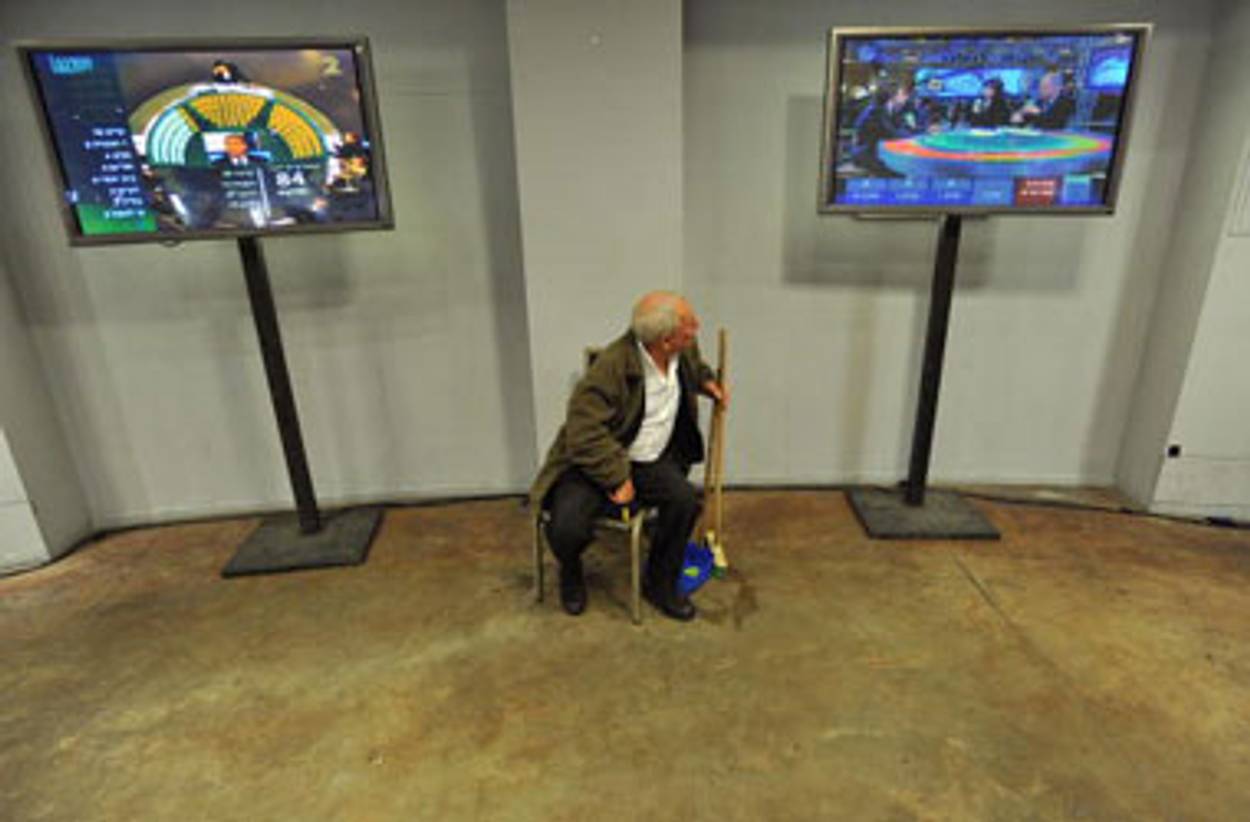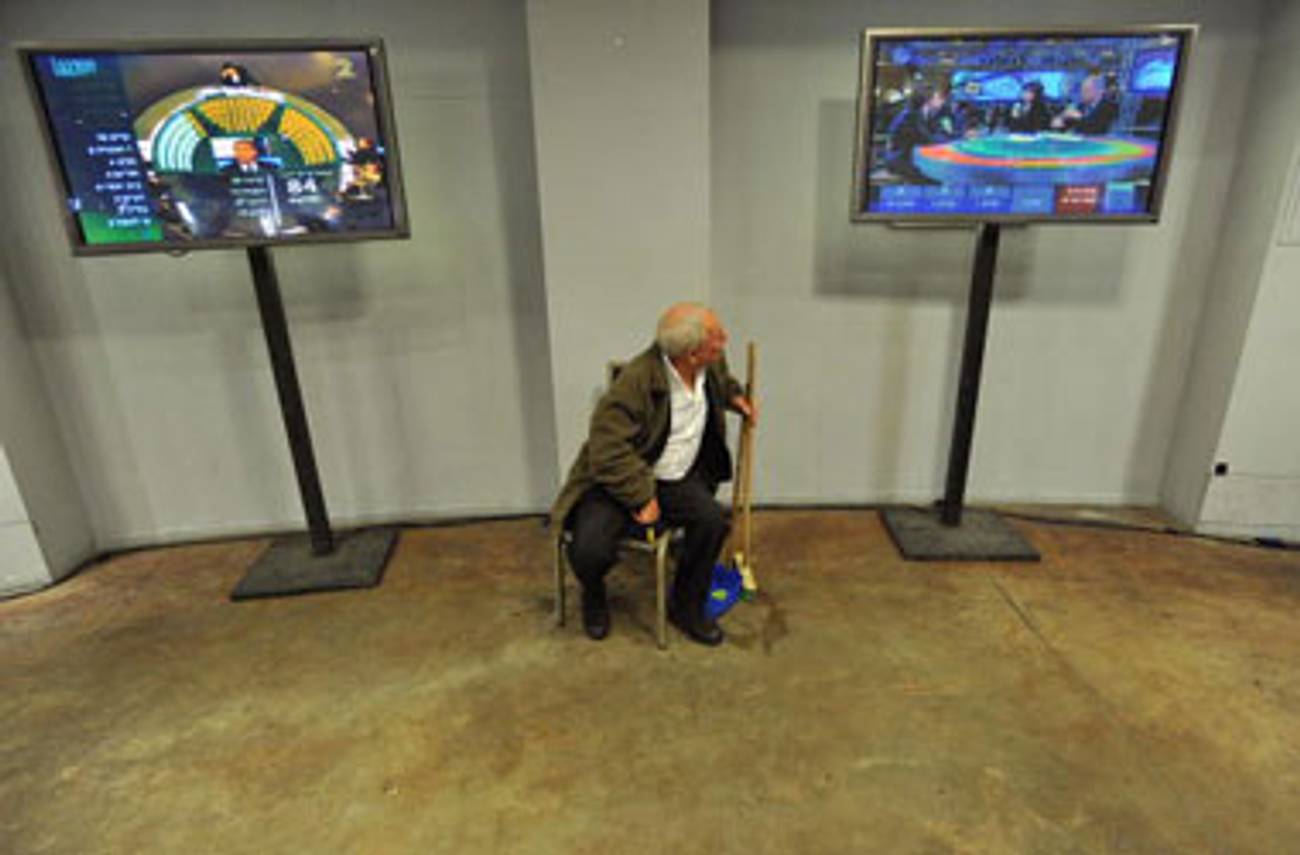Labor Pains
Ehud Barak led Israel’s Labor Party to irrelevance. Can anyone revive it?




One cold and rainy morning last February, Israel’s Labor Party woke up to a political reality it had never known before. For the first time since it was established in 1968, when several left-wing parties united under the leadership of Mapai, Labor found itself outside the exclusive club of the two parties with the largest number of Knesset seats. After years of being in charge or, at least, the party leading the opposition against its largest rival on the right, Labor found itself relegated to the margins not only by Likud and Kadima, but also by Avigdor Lieberman’s extremist party, which has no political tradition. Even Lieberman, with police investigations breathing down his neck and a candidate list comprised of models and retired singers, managed to get two more seats than the party whose roots go back to David Ben-Gurion.
How did Labor fall so far? What’s its future? These questions have gnawed at me in the months since the election as I’ve tried to find a silver lining to Labor’s defeat.
In Israel’s 17 national elections nearly every party other than the two biggest has been parochial, claiming to represent specific cohorts of the Israeli public: the ultra-Orthodox, the elderly, traditional Sephardim, and the National Religious. Suddenly, this year, the most significant party in Israel’s history found itself the size of a sectarian party. But worse, it lacks even a parochial party’s focus: Who does it represent? Kibbutzniks? Ashkenazis? Workers? A profile of Labor party voters, just like its platform, is very fuzzy. And after a non-exhaustive check of my friends and acquaintances, I could only conclude that most of the people who voted Labor did so out of a years-long habit or through a process of elimination and with very little enthusiasm, purely out of fear of other, even less deserving alternatives.
There are many reasons for the collapse of Labor, but the major one is that it no longer knows what it stands for. If the word “labor” once meant a clear, left-wing socialist ideology, a party that professed to be concerned with the weaker sectors of society and sought peace with our neighbors, today it has become a group of elected officials unable to agree on any consistent platform. Can Ehud Barak, the millionaire who lives in a luxurious apartment, in any way represent social solidarity with the working class? Can the same Barak who was defense minister during the war in Gaza really be a viable alternative left of Kadima leader Tzipi Livni, for example, who was supposed to represent—at least on paper—a more hawkish view than his? And if Labor does not represent a moderate, social-democrat leftist ideology, what is its raison d’etre? After all, if there is no problem picturing its leader running for the Knesset on the Likud or Kadima ticket, then why vote for such a nebulous entity as the Labor Party when you can vote for the real thing?
In the many interviews Barak gave after stepping down as prime minister, he mentioned that, in the 2001 Taba peace talks, it became clear to him that the Palestinian leadership was not really interested in a comprehensive peace agreement and that all attempts to negotiate with them were futile. Disappointed in the peace process and what he saw as the absence of a genuine partner on the other side of the table, Barak changed his views radically and should have left the Labor party to embark on a different political path. Instead, he went back to Labor and led it into a united nationalist government headed by parties ostensibly to its right in the political spectrum, where he fits in naturally and completely.
But the personal change Barak underwent does not explain why members of Labor chose to hand him the reins. The last time Barak was elected to lead Labor, his opponent was Ami Ayalon, former commander-in-chief of the Navy and a supporter of the Geneva Accord. Ayalon was an inexperienced politician but one who clearly represented Labor’s historical ideology. Always perceived as a man with a modest lifestyle, Ayalon was a more natural choice to follow in the footsteps of Ben Gurion and Yitzhak Rabin, both also known for their modesty, than the arrogant Barak. Nonetheless, Ayalon lost that race, a fact that indicates a deeper crisis than the one Labor experienced: the party’s members opted not to elect the candidate who carries the party’s spirit. Instead, they chose Barak, who has come to symbolize the ambiguous and unclear future of the Left.
When Palestinians in the territories elected Hamas in 2006, most supporters of the Zionist left found themselves up against a wall. The previous decade had showed that with every Israeli concession, the situation in the region deteriorated. Many believed that the unilateral withdrawal from Lebanon, particularly the way it was carried out, led to the Second Intifada and the strengthening of Hezbollah. Others believed that the unilateral disengagement from the territories caused the Hamas victory in the Gaza elections. While the radical left continued to claim that the efforts failed because Israel wasn’t prepared to give enough, the mainstream Zionist left was trapped. On the one hand, it wasn’t ready for greater concessions or direct contacts with the fanatical Hamas, but on the other hand, given the situation, it could not offer a political alternative to the total reliance on military solutions proposed by the right. And so, under the circumstances, the Zionist left has become a passive group devoid of pragmatic vision. When a political entity is unable to propose initiatives and settles for passive responses to the existing situation, it’s no wonder that it loses its authority to other parties that project a clearer and often more impassioned view.
Some people see the Labor Party’s entry into Netanyahu’s government as the final nail in its coffin. Many will gloat when it finally vanishes. Enemies on the right will feel that its demise delegitimizes the left. Enemies on the left will consider it proof that Labor’s existence was always based on lies. I believe that this wretched year will lead to positive changes in the party and in the end, we’ll see a new party that will leap into the existing vacuum. It will call itself Labor or some other name, and pledge itself, first of all, to champion social justice and commit itself to working for the weaker sectors of the population: the elderly, minorities, foreign workers, and others. And it will be forced to create a new, pragmatic ideology that may not please all of us, but at the same, will also make it difficult for our neighbors to mire themselves in their isolationist and militant positions.
I can already identify the potential leader of that new party among the sparse rows of Labor’s Knesset members, and he—how ironic—is the man who succeeded in mediating between Barak and Netanyahu during the last coalition negotiations that unsuccessfully attempted to bring the Labor Party into the Likud government, inadvertently bringing about the end of an era. This man isn’t a general and still hasn’t accumulated a private fortune. He is Sephardic, counter to the leftist, Ashkenazic stereotype that the right has exploited in every election campaign. His name is Ofer Eini, head of the Histadrut Labor Federation, a man who, in contrast to his predecessors, has rarely appeared in the media, but has done an impressive job of representing Israel’s workers. He is discreet, seemingly ego-less, and has won the respect of party leaders on all sides, unusual insofar as union chiefs are typically despised by politicians. With almost no strikes or threats, but with admirable determination, Eini has managed to achieve goals—a stable labor agreement in one of the most difficult economic periods in the life of the country. And who knows, maybe the same down-to-earth pragmatism that solved most of the labor-management negotiation problems will succeed in the regional arena as well, exactly where Barak’s ideology and arrogance failed.
Etgar Keret is Tablet Magazine’s columnist in Israel.
Translated by Sondra Silverston
Etgar Keret is a Tel Aviv-based filmmaker and fiction writer. He writes a regular column from Israel for Tablet.
Etgar Keret is a Tel Aviv-based filmmaker and fiction writer.